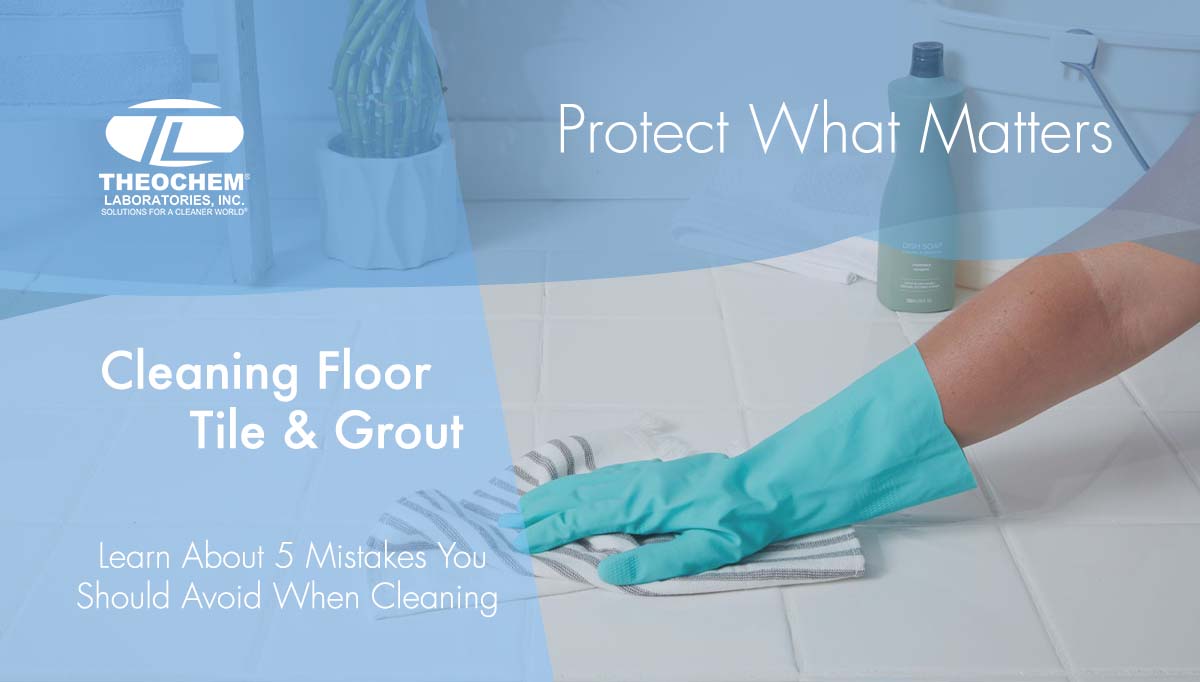Whether you’re a new homeowner or you’ve lived in your home for a while, one area you may realize makes a world of a difference in the appearance of your home is your tiles. Aside from cleaning the tile itself, you also need to factor in the grout, which acts as the filler between gaps and open areas in your tiles once your tiles are set. In this article, we will teach you how to protect your grout and avoid costly mistakes when it comes to maintaining and cleaning the tiles in your home regardless of whether it’s bathroom tile, kitchen backsplash, or your tile floors.
If you’re a homeowner with tile in more than one room such as your kitchen, restroom, or living room, you may want to switch up your strategy before you attempt cleaning the tile and the grout in that area. Grout is traditionally a mix of powdered cement, sand, lime, and color pigment that once mixed with water will harden and occupy the space between your tiles. The tile in each of the aforementioned rooms is exposed to different types of gunk that gets in the grout. This could be in the form of dirt, grease, dirty mop water, or another contaminant. Also, because of the rough texture of grout, makes it easier for dirt to settle into the grout, making it tough to remove stains from the area. Without further delay, we will dive into 5 of the most common mistakes homeowners encounter when attempting to clean their tile and grout as well as our expert recommendations on how to avoid these mistakes entirely.
- Using the Wrong Chemicals: As mentioned earlier, gunk on your tiles and grout can come from a variety of sources and applying cleaners packed with ammonia or bleach can be corrosive to the surfaces you apply them to. When cleaning tile and grout in your kitchens such as your floors or backsplash, we recommend using our Kitchen Power Concentrated Multi-Surface Cleaner which can effectively target contaminants such as grease, food, or fat-based stains.
- Not Cleaning Spills Quickly: Tile and grout are not indestructible and they certainly aren’t immune to discoloration. Although these spills can occur in any room, we’d like to continue the focus in the kitchen. This area experiences the most spills, some you may not even see happen, and not cleaning these spills in time only expedite the decay in your tile and grout. Another fantastic solution when cleaning your kitchen is our Shur Orange Natural Orange Degreaser Concentrate with its unique formulation of butyl power with pure Valencia oranges, this product is safe on virtually all hard surfaces and leaves a pleasant citrus fragrance after cleaning desired areas.
- Ditch the Hard Scrubbing: Using tough love when cleaning your tile and your grout may sound good on paper, but it could actually be doing more harm than good. Applying excess force and scrubbing hard could scratch your tile surfaces, taking the pristine look away from your hard surfaces. Also, hard scrubbing can lead to wearing out your grout over time which is another end result you should avoid. Eliminate steel wool and scrubbing powders from your lineup and utilize softer fabrics such as cloths when cleaning your tile.
- Leaving Grout Dirty & Unattended: Moving on to the restroom, there is an entirely different host of stains and buildup that can arise in these areas of your home. Buildup stemming from mold, mildew, dirt, rust, lime buildup, or urine left unattended can become a much more difficult chore if left to the wayside. Aside from following a routine maintenance schedule on combating the buildup, you also want the best restroom cleaner that can eliminate these tough stains. Our Active-Ate Concentrated Bio-Enzymatic Floor Cleaner & Drain Maintainer performs wonderfully when degrading organic soils that accumulate over time.
- Using Too Much Water: The next area we’d like to switch focus to is your living room or any other shared rooms where your tile is on full display for guests to see. With these rooms in mind, the next mistake we want to address is using too much water when cleaning your tile and grout. Sure, water is always a mainstay when cleaning any surface in your home. However, relying on an excess of too much water might have the opposite outcome of what you’re looking for. Using a surplus of water can actually weaken the adhesive underneath your tile and eventually cause your grout to crumble as well. Relying on an everyday cleaner such as our P-M-C Porcelain, Tile & Metal Cleaner will do wonders for your tiles in the long run. This product removes mineral deposits from a number of hard surfaces and won’t eat away at tiles over time like bleach or ammonia-based cleaners would.
Tile can enhance the look of any home, so maintaining your appearance of yours is paramount to ensure it experiences a long and healthy life. By following our recommendations above and avoiding some of the common pitfalls we outlined, you should be able to enjoy your tile and grout for years to come. We hope this article sheds some light on the topic and is able to help you keep your home cleaner!


